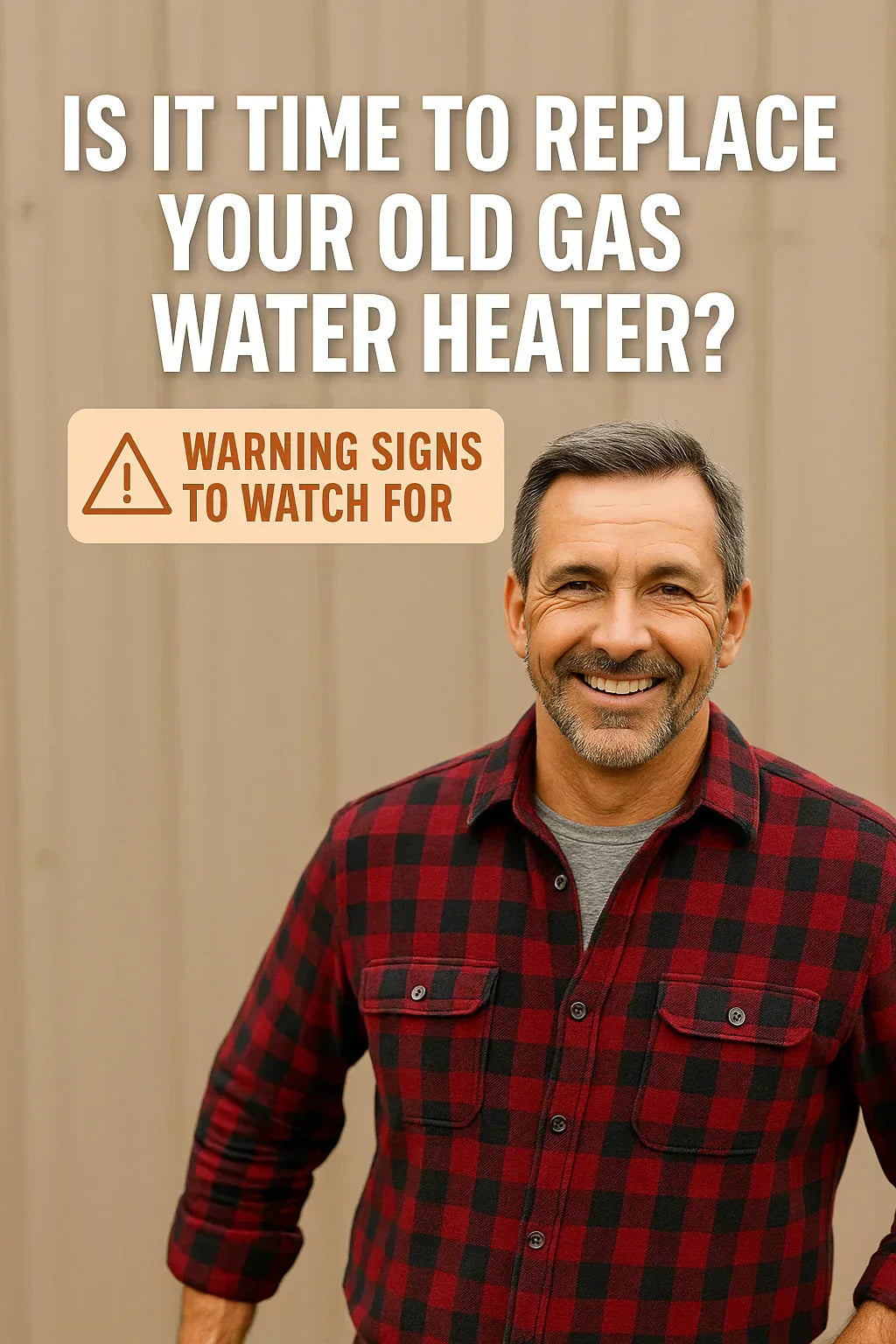Many homeowners aren’t sure when their gas water heater is nearing the end of its service life. As Mike Sanders, I’ve inspected thousands of units over my 20+ years in the field, and I can tell you — knowing the early warning signs can save you from sudden breakdowns, water damage, or even dangerous situations. In this 2025 guide, I’ll break down exactly what to watch for.
📆 Typical Lifespan of Gas Water Heaters (2025 Averages)
| Maintenance Level | Lifespan |
|---|---|
| Poor Maintenance | 6-8 years |
| Average Maintenance | 10-12 years |
| Excellent Maintenance | 12-15+ years |
Most State ProLine Atmospheric Vent 50-Gallon Gas Water Heaters last 10-15 years with proper care.
🚩 Top Warning Signs Your Gas Water Heater Is Failing
1️⃣ Age Over 10 Years
-
Check the serial number on the rating plate.
-
Most major brands code manufacturing date into serial number (check manufacturer’s website).
-
Proactive replacement after 12 years is often safer than waiting for failure.
2️⃣ Rusty or Discolored Water
-
Brown, orange, or rusty hot water signals internal tank corrosion.
-
May indicate failing anode rod or tank liner breach.
-
If rust appears only in hot water (not cold), the water heater is likely the source.
3️⃣ Unusual Noises (Popping or Rumbling)
-
Sediment buildup creates air pockets that pop or rumble during heating.
-
This reduces efficiency and stresses the tank.
-
Regular flushing minimizes this risk.
4️⃣ Water Leaks or Puddling
-
Leaks around base indicate internal tank breach.
-
Even small leaks can worsen quickly.
-
Shut off unit and call a plumber immediately.
5️⃣ Pilot Light or Burner Issues
-
Frequent pilot outages or ignition problems suggest failing components.
-
Faulty thermocouple, gas valve, or burner assembly may need replacement.
-
Multiple component failures often justify full replacement.
6️⃣ Temperature Fluctuations
-
Inconsistent hot water suggests thermostat, gas control, or burner issues.
-
Replacement may be more economical than repeated repairs.
7️⃣ Higher Energy Bills
-
Aging tanks lose efficiency due to sediment and degraded insulation.
-
Rising gas bills may signal declining water heater performance.
8️⃣ Carbon Monoxide Detector Alerts
-
Venting issues may cause backdrafting of combustion gases.
-
Immediate professional inspection required.
9️⃣ Low Hot Water Pressure
-
Sediment and mineral deposits clog internal plumbing passages.
-
May eventually block hot water flow completely.
🔟 Visible Rust or Corrosion on Tank Exterior
-
Exterior corrosion is often a late-stage failure symptom.
-
Time for immediate replacement.
⚠️ Emergency Warning Signs
Seek immediate professional help if you observe:
-
Active gas odor (possible leak)
-
Soot buildup around vent hood (poor combustion)
-
Water leaking from top pressure relief valve unexpectedly
-
Discolored flame (should always burn clean blue)
-
Audible hissing, popping, or loud banging noises
Safety should always override repair cost considerations.
🧰 Typical Repair vs. Replacement Costs (2025 Averages)
| Repair Type | Cost Range |
| Thermocouple Replacement | $100 – $200 |
| Gas Valve Replacement | $300 – $500 |
| Anode Rod Replacement | $150 – $250 |
| Full Replacement (New Unit + Install) | $1,500 – $2,800 |
If repair costs exceed 50% of replacement, replacement is usually the better investment.
🔄 When Proactive Replacement Makes Sense
Even before failure, replacement makes sense if:
-
Unit exceeds 12 years of service
-
Multiple repairs have been needed recently
-
Household demand has changed (larger family, remodel, etc.)
-
Energy costs are rising
-
Local rebates or tax credits improve payback period
🌎 New Efficiency Standards & Environmental Incentives (2025)
-
Federal 25C Tax Credit: Up to $600 for ENERGY STAR models
-
Low-NOx Requirements: Mandatory in many states
-
Higher Uniform Energy Factor (UEF) ratings required for new installs
Upgrading proactively allows you to benefit from new rebate programs.
🔐 Warranty Status Check
-
State ProLine models typically offer 6-10 year warranties.
-
Check your original purchase date and receipt.
-
Warranties rarely cover failure after year 10.
🏠 2025 Installation Upgrade Opportunities
When replacing an aging water heater, consider:
-
Earthquake strapping (if applicable)
-
Upgraded expansion tank (protects plumbing system)
-
Improved venting for safety and draft performance
-
Digital Wi-Fi controllers on newer models (monitor usage remotely)
🧠 Mike Sanders’ Rule of Thumb:
“Once your gas water heater crosses 10 years old, start saving for a proactive replacement. Don’t wait for failure.”
Being proactive means fewer emergencies, lower repair costs, and improved efficiency for years to come.
🔗 Verified Helpful Resources:
About Mike Sanders:
With decades of water heater repair and replacement experience, I help homeowners know when to maintain, when to repair, and when it’s time to replace—with safety and long-term savings always top priority.







